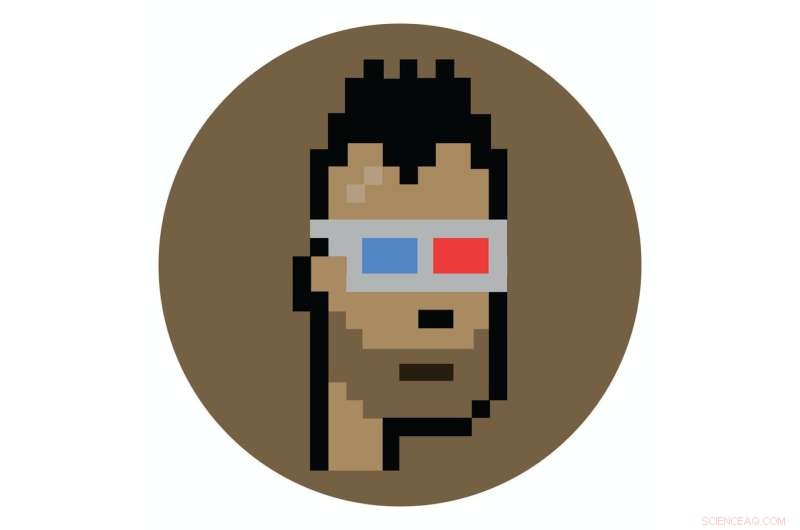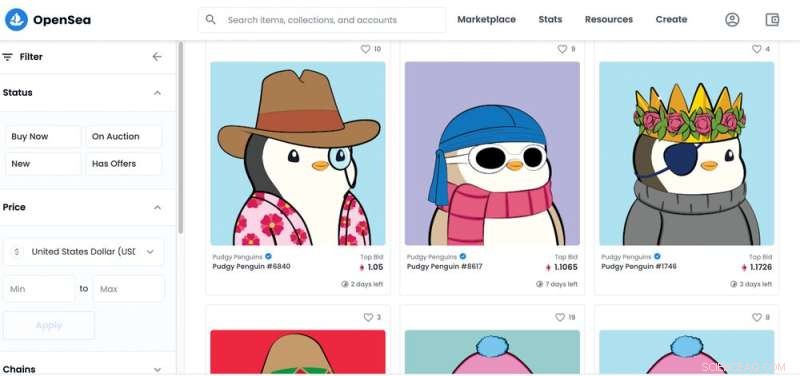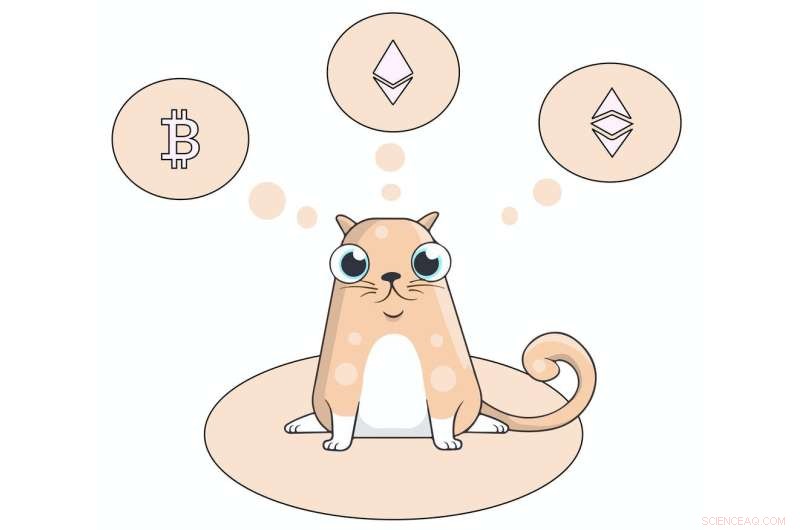
Benvenuti nel mondo della proprietà digitale. Credito:CreatorsTempe
Gli NFT o token non fungibili hanno catturato l'immaginazione del pubblico per la prima volta quando un collage digitale di un artista di nome Beeple è stato venduto per 69 milioni di dollari (51 milioni di sterline) da Christie's nel marzo 2021. Da allora, c'è stata un'esplosione nell'uso di queste unità per l'archiviazione di contenuti digitali, che vengono acquistati e venduti utilizzando libri mastri online noti come blockchain.
Da quel collegamento iniziale con l'arte, vediamo che le NFT vengono utilizzate in numerosi altri modi. In particolare, molti vengono scambiati come oggetti da collezione su borse come OpenSea e Rarible. Ultimamente, ad esempio, una serie di 8.888 adorabili "Pudgy Penguins" ha fatto scalpore, ognuno dei quali riflette la propria caratteristica unica, con uno venduto per un record di 150 ethereum (circa US $ 500.000).
Tuttavia, che si tratti di un'opera d'arte digitale notevole o di un simpatico pinguino digitale, gli NFT sono essenzialmente jpeg o gif scambiabili. A differenza degli oggetti da collezione fisici, un proprietario di NFT non sarà in grado di visualizzare la risorsa nella propria casa, tranne che su uno schermo. Potrebbero pensare di poterlo visualizzare su un sito Web, ma non è necessariamente così. Quindi, cosa ottiene effettivamente qualcuno quando acquista un NFT e cosa possiede veramente da un punto di vista legale?
La nuova frontiera
Per comprendere le NFT, è importante capire cosa si intende per "fungibile". Fungible deriva dal verbo latino fungi , che significa esibirsi. In un contesto più ampio, questo significa intercambiabile e riguarda se qualcosa può essere scambiato.
Il denaro è fungibile, nel senso che puoi comprare una merce del valore di £ 10 con qualsiasi banconota da £ 10; non importa quale usi. D'altra parte, gli NFT non possono essere scambiati come con un altro. Sono ognuno unico nel suo genere, o uno di un'edizione limitata.
I contenuti venduti come NFT possono essere creati in molti modi. Può essere generato dal computer, che è stata la base per la produzione di 10.000 CryptoPunk unici nel 2017.
Può riflettere un lavoro collaborativo, come la serie di NFT musicali del cantautore inglese Imogen Heap, "Firsts". Ciò ha comportato la sua improvvisazione insieme alle immagini fornite dall'artista Andy Carne. Oppure gli NFT possono rappresentare una singola opera, come l'opera d'arte di Beeple; o una serie di articoli, come la serie "NFT Yourself" dei Kings of Leon in cui le risorse offerte includevano album musicali con caratteristiche uniche e biglietti speciali per concerti.

Pssst, ti va un pinguino? Credito:OpenSea
Diritti limitati
Gli NFT consentono al proprietario di un'opera o collezione limitata di raggiungere direttamente il proprio pubblico. Mentre prima non era possibile vendere qualcosa come il primo tweet in assoluto, o una gif a tema taco, o addirittura un'opera d'arte online, ora individui, aziende o organizzazioni culturali possono farlo purché ne siano i legittimi proprietari.
Il creatore può farlo perché, secondo la legge sul copyright del Regno Unito, il copyright sorge automaticamente quando viene creata un'opera, purché rifletta la "creazione intellettuale dell'autore". Ciò significa che il creatore di un'opera è il proprietario del copyright e può farne ciò che vuole.
When someone buys an NFT from the creator, they obtain ownership in the sense that it becomes their property. After all, an NFT is a digital certificate of ownership representing the purchase of a digital asset, traceable on the blockchain.
But the NFT holder does not have any other rights to the work. This includes those offered under copyright law, such as the right of communication to the public (in other words, making the asset available to the world at large), or the rights of adaptation or reproduction.
The situation is the same if you buy a physical collectable. Owning a painting does not automatically give you the right to display it in public. It also doesn't give you the right to sue for infringement of copyright if someone reproduces the image in the painting without permission. To obtain such rights, you either need to be the copyright owner of the work or have the copyright assigned to you by the creator (in writing and signed).
The trouble with online content is that, by virtue of its digital nature, it is easy to share, copy and reproduce. Buyers of NFTs need to understand that they would be infringing the copyright if they engage in such activities without the permission of the right holder. The only way such rights can be transferred is through the terms embedded in the NFT, in the form of a license.

CryptoKitties allow owners to make up to US$100,000 a year from them. Credit:Vector Factory
There have been some NFTs where the buyer has been granted the right to use the copyright in a limited way. For example, owners of CryptoKitties NFTs have been allowed to make up to US$100,000 in gross revenues from them each year. In other cases, creators have specifically restricted all commercial use of the work. For example, the Kings of Leon stipulated that their NFT music was for personal consumption only.
Buyers therefore need to be clear that the main reasons to buy an NFT are the speculative investment and the pleasure of having something unique from an admired artist, brand, sports team, or whatever. Unless the terms allow it, buyers will only have a limited ability to share the creative work on public platforms or to reproduce it and make it available for others.
Incidentally, buyers should also be aware that the blockchain cannot absolutely know whether a creative work is authentic. Someone can take another person's work and tokenise it as an NFT, thereby infringing the rights of the copyright owner. You need to be sure that you are buying something that originated from the creator.
In short, NFTs are probably here to stay, but they clearly raise ownership questions relating to copyright law. This may not be immediately clear to most people, and it's important that you understand the limits of what you are getting for your money.